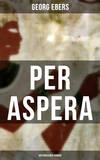Kitabı oku: «The Bride of the Nile. Complete», sayfa 37
CHAPTER XVII
Paula passed a fearful night in the small, frightfully hot prison-cell in which she and Betta were shut up. She could not sleep, and when once she succeeded in closing her eyes she was roused by the yells and clanking chains of the captives in the common prison and the heavy step of another sufferer who paced the room overhead, even more restless than herself.
Poor fellow-victim! Was it a tortured conscience that drove him hither and thither, or was he as innocent as she was, and was it longing, love, and anxiety that bereft him of sleep?
He was no vulgar criminal. There was no room for those in this part of the building; and at midnight, when the noise in the large hall was suddenly silenced, soft sounds of the lute came down to her from his cell, and only a master could strike the strings with such skill.
She cared nothing for the stranger; but she was grateful for his gift of music, for it diverted her thoughts from herself, and she listened with growing interest. Glad of an excuse for rising from her hard, hot bed, she sprang up and placed herself close to the one window, an opening barred with iron. But then the music ceased and a conversation began between the warder and her fellow-prisoner.
What voice was that? Did she deceive herself, or hear rightly?
Her heart stood still while she listened; and now every doubt was silenced: It was Orion, and none other, whom she heard speaking in the room above. Then the warder spoke his name; they were talking of her deceased uncle; and now, as if in obedience to some sign, they lowered their voices. She heard whispering but could not distinguish what was said. At length parting words were uttered in louder tones, the door of the cell was locked and the prisoner approached his window.
At this she pressed her face close to the heated iron bars, looked upwards, listened a moment and, as nothing was stirring, she said, first softly, and then rather louder: “Orion, Orion!”
And, from above, her name was spoken in reply. She greeted him and asked how and when he had come hither; but he interrupted her at the first words with a decisive: “Silence!” adding in a moment, “Look out!”
She listened in expectancy; the minutes crept on at a snail’s pace to a full half hour before he at last said: “Now!” And, in a few moments, she held in her hand a written scroll that he let down to her by a lutestring weighted with a scrap of wood.
She had neither light nor fire, and the night was moonless. So she called up “Dark!” and immediately added, as he had done: “Look out.”
She then tied to the string the two best roses of those Pulcheria had brought her, and at her glad “Now!” they floated up.
He expressed his thanks in a few low chords overflowing with yearning and passion; then all was still, for the warder had forbidden him to sing or play at night and he dared not risk losing the man’s favor.
Paula laid down again with Orion’s letter in her hand, and when she felt slumber stealing upon her, she pushed it under her pillow and ere long was sleeping on it. When they both woke, soon after sunrise, they had been dreaming of each other and gladly hailed the return of day.
How furious Orion had felt when the prison door closed upon him! He longed to wrench the iron bars from the window and kick down or force the door; and there is no more humiliating and enraging feeling for a man than that of finding himself shut up like a wild beast, cut off from the world to which he belongs and which he needs, both to give him all that makes life worth having, and to receive such good as he can do and give.
Yesterday their dungeon had seemed a foretaste of hell, they had each been on the verge of despair; to-day what different feelings animated them! Orion had been the victim of blow on blow from Fate—Paula had looked forward to his return with an anxious and aching heart; to-day how calm were their souls, though both stood in peril of death.
The legend tells us that St. Cecilia, who was led away to the rack from her marriage feast, even in the midst of the torments of martyrdom, listened in ecstasy to heavenly music and sweet echoes of the organ; and how many have had the same experience! In the extremity of anguish and danger they find greater joys than in the midst of splendor, ease and the intoxicating pleasures of life; for what we call happiness is the constant guest of those who have within reach that for which their souls most ardently long, irrespective of place and outward circumstances.
So these two in their prison were what they had not been for a long time: full of heartfelt bliss; Paula with his letter, which he had begun at the Kadi’s house, and in which he poured out his whole soul to her; Orion in the possession of her roses, on which he feasted his eyes and heart, and which lay before him while he wrote the following lines, which the kindhearted warder willingly transmitted to her:
Lo! As night in its gloom and horror fell on my prison,
Methought the sun sank black, dark forever in death.
I drew thy roses up, and behold! from their crimson petals
Beamed a glory of light, a glow as of sunshine and day!
Love! Love is the star that rose with those fragrant flowers;
Rose, as Phoebus’ car comes up from the tossing waves.
Is not the ardent flame of a heart that burns with passion
Like the sparkling glow-worm hid in the heart of the rose?
While it yet was day, and we breathed in freedom and gladness,
While the sun still shone, that light seemed small and dim;
But now, when night has fallen, sinister, dark, portentous,
Its kindly ray beams forth to raise our drooping souls.
As seeds in the womb of earth break from the brooding darkness,
Or as the soul soars free, heaven-seeking from the grave,
So the hopeless soil of a dungeon blossoms to rapture,
Blooms with roses of Love, more sweet than the wildling rose!
And when had Paula ever felt happier than at the moment when this offering from her lover, this humble prison-flower, first reached her.
Old Betta could not hear the verses too often, and cried with joy, not at the poem, but at the wonderful change it had produced in her darling. Paula was now the radiant being that she had been at home on the Lebanon; and when she appeared before the assembled judges in the hall of justice they gazed at her in amazement, for never had a woman on her trial for life or death stood in their presence with eyes so full of happiness. And yet she was in evil straits. The just and clement Kadi, himself the loving father of daughters, felt a pang at his heart as he noted the delusive confidence which so evidently filled the soul of this noble maiden.
Yes, she was in evil straits: a crushing piece of evidence was in their hands, and the constitution of the court—which was in strict conformity with the law must in itself be unfavorable to her. Her case was to be tried by an equal number of Egyptians and of Arabs. The Moslems were included because by her co-operation, Arabs had been slain; while Paula, as a Christian and a resident in Memphis, came under the jurisdiction of the Egyptians.
The Kadi presided, and experience had taught him that the Jacobite members of the bench of judges kept the sentence of death in their sleeves when the accused was of the Melchite confession. What had especially prejudiced them against this beautiful creature he knew not; but he easily discovered that they were hostile to the accused, and if they should utter the verdict “guilty”, and only two Arabs should echo it, the girl’s fate was sealed.
And what was the declaration which that whiterobed old man among the witnesses desired to make—the venerable and learned Horapollo? The glances he cast at Paula augured her no good.
It was so oppressively, so insufferably hot in the hall! Each one felt the crushing influence, and in spite of the importance of the occasion, the proceedings every now and then came to a stand-still and then were hurried on again with unseemly haste.
The prisoner herself seemed happily to be quite fresh and not affected by the sultriness of the day. It had cost her small effort to adhere to her statement that she had had no share in the escape of the sisters, when catechised by the ruffianly negro; but she found it hard to defy Othman’s benevolent questioning. However, there was no choice, and she succeeded in proving that she had never quitted Memphis nor the house of Rufinus at the time when the Arab warriors met their death between Athribis and Doomiat. The Kadi endeavored to turn this to account for her advantage and Obada, who had found much to whisper over with his grey-headed neighbor on the bench reserved for witnesses, let him talk; but no sooner had he ended than the Vekeel rose and laid before the judges the note he had found in Orion’s room.
It was undoubtedly in the young man’s handwriting and addressed to Paula, and the final words: “But do not misunderstand me. Your noble, and only too well-founded desire to lend succor to your fellow-believers would have sufficed....” could not fail to make a deep impression. When the Kadi questioned Paula, however, she replied with perfect truth that this document was absolutely unknown to her; at the same time she did not deny that the sisters of St. Cecilia, who were of her own confession, had always had her warmest wishes, and that she had hoped they might succeed in asserting their rights in opposition to the patriarch.
The deceased Mukaukas, and the Jacobite members of the town-council even, had shared these feelings and the Arabs had never interfered with the pious sicknurses.
The calm conciseness with which she made these statements had a favorable effect, on her Moslem judges especially, and the Kadi began to have some hopes for her; he desired that Orion should be called as being best able to account for the meaning of the letter he had written but never sent.
On this the young man appeared, and though he and Paula did their utmost to preserve a suitable demeanor, every one could see the violent agitation they felt at meeting each other in such a situation. Horapollo never took his eyes off Orion, whom he now saw for the first time, and his features put on a darkening and menacing expression.
The young man acknowledged that he had written the letter in question, but he and Paula alike referred it to the danger with which the sisterhood had long been threatened from the patriarch’s hostility. The assistance which, in that document, he had refused he would have afforded readily and zealously at a later and fit season, and he could have counted on the aid of the Arab governor Amru, who, as he would himself confirm, shared the views of the Mukaukas George as to the nuns’ rights.
At this the old sage murmured loud enough to be heard: “Clever, very clever!” and the Vekeel laughed aloud, exclaiming:
“I call that a cunning way of lengthening your days! Be on your guard, my lords. These two are partners in the game and are intimately allied. I have proof of that in my own hands. That youngster takes as good care of the damsel’s fortune as though it were his own already, and what is more....”
Here Paula broke in. She did not know what the malicious man was going to say, but it was something insulting beyond a doubt. And there stood Orion, just as she had pictured him in moments of tender remembrance; she felt his eye resting on her in ecstasy. To go up to him, to tell him all she was feeling in this critical struggle for life or death, seemed impossible; but as the Vekeel began to disclose to their judges matters which concerned only herself and her lover, every impulse prompted her to interpose and, in this fateful hour, to do her friend such service as she once, like a coward, had shrank from. So with eager emotion, her eyes flashing, she interrupted the negro “Stop!” she cried, “you are wasting words and trouble. What you are trying to prove by subtlety I am proud and glad to declare. Hear it, all of you. The son of the Mukaukas is my betrothed!”
At the same time her eye sought to meet Orion’s. And thus, in the very extremity of danger, they enjoyed a solemn moment of the purest, deepest happiness. Paula’s eyes were moist with grateful tenderness, when Orion exclaimed:
“You have heard from her own lips what makes the greatest bliss of my life. The noble daughter of Thomas is my promised bride!”
There was a murmur among the Jacobite judges. ‘Till this moment several of them, oppressed by the heat, had sat dreaming with their heads sunk on their breasts, but now they were suddenly as wide-awake and alert as though a jet of cold water had been turned on to them, and one cried out: “And your father, young man? You have forgotten him in a hurry! What would he have said to such a disgrace to his blood as your marriage to a Melchite, the daughter of those who caused your two brothers to be murdered? Oh! if the dead could....”
“He blessed our union on his death-bed,” Orion put in.
“Did he, indeed?” asked another Jacobite with sarcastic scorn. “Then the patriarch was in the right when he refused to let the priests follow his corpse. That I should live to be witness to such crimes!”
But such words fell on the ears of the enraptured pair like the chirping of crickets. They felt, they cared for nothing but what this blissful moment had brought them, and never suspected that Paula’s glad avowal had sealed her death-warrant.
The wrath of the Jacobite faction now hastened the end. The prosecutor, an Arab, now represented how many Moslems had lost their lives in the affair of the nuns, and once more read Orion’s letter. His Christian colleagues tried to prove that this document could only refer to the flight, so ingeniously plotted, of the sisters; and now something quite new and unlooked-for occurred, which gave a fresh turn to the proceedings: the old man interrupted the Kadi to make a statement. At this Paula’s confidence rose again for the last speaker had somewhat shaken it. She felt sure that the tried friend and adoptive father of her faithful Philippus would take her part.
But what was this?
The old man seemed to measure her height in a glance which struck to her heart with its fierce enmity, and then he said deliberately:
“On the morning of the nuns’ flight the accused, Paula, went to the convent and there tolled the bell. Contradict me if you can, proud prefect’s daughter; but I warn you beforehand, that in that case, I shall be compelled to bring forward fresh charges.”
At this the horror-stricken girl pictured to herself the widow and daughter of Rufinus at her side on the condemned bench before the judges, and felt that denial would drag her friends to destruction with her; with quivering lips she confirmed the old man’s statement.
“And why did you toll the bell?” asked the Kadi.
“To help them,” replied Paula. “They are my fellow-believers, and I love them.”
“She was the originator of the treasonable and bloody scheme,” cried the Vekeel, “and did it for no other purpose than to cheat us, the rulers of this country.”
The Kadi however signed to him to be silent and bid the Jacobite counsel for the accused speak next. He had seen her early in the day, and came forward in the Egyptian manner with a written defence in his hand; but it was a dull formal performance and produced no effect; though the Kadi did his utmost to give prominence to every point that might help to justify her, she was pronounced guilty.
Still, could her crime be held worthy of death? It was amply proved that she had had a hand in the rescue of the nuns; but it was no less clear that she had been far enough away from the sisters and their defenders when the struggle with the Arabs took place. And she was a woman, and how pardonable it seemed in a pious maiden that she should help the fellow-believers whom she loved to evade persecution.
All this Othman pointed out in eloquent words, repeatedly and sternly silencing the Vekeel when he sought to argue in favor of the sentence of death; and the humane persuasiveness of the lenient judge won the hearts of most of the Moslems.
Paula’s appearance had a powerful effect, too, and not less the circumstance that their noblest and bravest foe had been the father of the accused.
When at length it was put to the vote the extraordinary result was that all her fellow Christians—the Jacobites—without exception demanded her death, while of the infidels on the judges’ bench only one supported this severe meed of punishment.
Sentence was pronounced, and as the Vekeel Obada passed close to Orion—who was led back to his cell pale and hardly master of himself—he said, mocking him in broken Greek: “It will be your turn to-morrow, Son of the Mukaukas!”
Orion’s lips framed the retort: “And yours, too, some day, Son of a Slave!”—but Paula was standing opposite, and to avoid infuriating her foe he was able to do what he never could have done else: to let the Vekeel and Horapollo pass on without a word in reply.
As soon as the door was closed on this couple, Othman nodded approvingly at Orion and said:
“Rightly and wisely done, my friend! The eagle should never forget that he must not use his pinions in a cage as he does between the desert and the sky.”
He signed to the guards to lead him away, and stood apart while the young man looked and waived an adieu to his betrothed.
Finally the Kadi went up to Paula, whose heroic composure as she heard the sentence of death had filled him with admiration.
“The court has decided against you, noble maiden,” he said. “But its verdict can he overruled by the clemency of our Sovereign Lord the Khaliff and the mercy of God the compassionate. Do you pray to Him—I and a few friends will appeal to the Khaliff.”
He disclaimed her gratitude, and when she, too, had been led away he added, in the figurative language of his nation, to the friends who were waiting for him:
“My heart aches! To have to pronounce such a verdict oppressed me like a load; but to have an Obada for a fellow Moslem and be bound to obey him—there is no heavier lot on earth!”
CHAPTER XVIII
The mysterious old sage had no sooner left the judgment-hall with the Vekeel than he begged for a private interview. Obada did not hesitate to turn the keeper of the prison, with his wife and infant, out of his room, and there he listened while Horapollo informed him of the fate to which he destined the condemned girl. The old man’s scheme certainly found favor with the Negro; still, it seemed to him in many respects so daring that, but for an equivalent service which Horapollo was in a position to offer Obada, he would scarcely have succeeded in obtaining his consent.
All the Vekeel aimed at was to make it very certain that Orion had had a hand in the flight of the nuns, and chance had placed a document in the old man’s hands which seemed to set this beyond a doubt.
He had effected his removal to the widow’s dwelling in the cool hours of early morning. He had taken with him, in the first instance, only the most valuable and important of his manuscripts, and as he was placing these in a small desk—the very same which Rufinus had left for Paula’s use—Horapollo found in it the note which the youth had hastily written when, after waiting in vain for Paula as she sat with little Mary, he had at last been obliged to depart and take leave of Amru. This wax-tablet, on which the writing was much defaced and partly illegible, could not fail to convince the judges of Orion’s guilt, and the production of this piece of evidence enabled the old man to extort Obada’s consent to his proposal as to the mode of Paula’s death. When they finally left the warder’s room, the Negro once more turned to the keeper of the prison and told him with a snort, as he pointed to his pretty wife and the child at her breast, that they should all three die if he allowed Orion to quit his cell for so much as an instant.
He then swung himself on to his horse, while Horapollo rode off to the Curia to desire the president of the council to call a meeting for that evening; then he betook himself to his new quarters.
There he found his room carefully shaded, and as cool as was possible in such heat. The floor had been sprinkled with water, flowers stood wherever there was room for them, and all his properties in scrolls and other matters had found places in chests or on shelves. There was not a speck of dust to be seen, and a sweet pervading perfume greeted his sensitive nostrils.
What a good exchange he had made! He rubbed his withered hands with satisfaction as he seated himself in his accustomed chair, and when Mary came to call him to dinner, it was a pleasure to him to jest with her.
Pulcheria must lead him through the viridarium into the dining-room; he enjoyed his meal, and his cross, wrinkled old face lighted up amazingly as he glanced round at his feminine associates; only Eudoxia was absent, confined to her room by some slight ailment. He had something pleasant to say to each; he frankly compared his former circumstances with his present position, without disguising his heartfelt thankfulness; then, with a merry glance at Pulcheria, he described how delightful it would be when Philippus should come home to make the party complete—a true and perfect star: for every Egyptian star must have five rays. The ancients had never painted one otherwise nor graven it in stone; nay, they had used it as the symbol for the number five.
At this Mary exclaimed: “But then I hope—I hope we shall make a six-rayed star; for by that time poor Paula may be with us again!”
“God grant it!” sighed Dame Joanna. Pulcheria, however, asked the old man what was wrong with him, for his face had suddenly clouded. His cheerfulness had vanished, his tufted eyebrows were raised, and his pinched lips seemed unwilling to part, when at length he reluctantly said:
“Nothing—nothing is wrong.... At the same time; once for all—I loathe that name.”
“Paula?” cried the child in astonishment. “Oh! but if you knew…”
“I know more than enough,” interrupted the old man. “I love you all—all; my old heart expands as I sit in your midst; I am comfortable here, I feel kindly towards you, I am grateful to you; every little attention you show me does me good; for it comes from your hearts: if I could repay you soon and abundantly—I should grow young again with joy. You may believe me, as I can see indeed that you do. And yet,” and again his brows went up, “and yet, when I hear that name, and when you try to win me over to that woman, or if you should even go so far as to assail my ears with her praises—then, much as it would grieve me, I would go back again to the place where I came from.”
“Why, Horapollo, what are you saying?” cried Joanna, much distressed.
“I say,” the old man went on, “I say that in her everything is concentrated which I most hate and contemn in her class. I say that she bears in her bosom a cold and treacherous heart; that she blights my days and my nights; in short, that I would rather be condemned to live under the same roof with clammy reptiles and cold-blooded snakes than…”
“Than with her, with Paula?” Mary broke in. The eager little thing sprang to her feet, her eyes flashed lightnings and her voice quivered with rage, as she exclaimed: “And you not only say it but mean it? Is it possible?”
“Not only possible, but positive, sweetheart,” replied the old man, putting out his hand to take hers, but she shrank back, exclaiming vehemently:
“I will not be your sweetheart, if you speak so of her! A man as old as you are ought to be just. You do not know her at all, and what you say about her heart…”
“Gently, gently, child,” the widow put in; and Horapollo answered with peculiar emphasis.
“That heart, my little whirlwind!—it would be well for us all if we could forget it, forget it for good or for evil. She has been tried to-day, and that heart is sentenced to cease beating.”
“Sentenced! Merciful Heaven!” shrieked Pulcheria, and as she started up her mother cried out:
“For God’s sake do not jest about such things, it is a sin.—Is it true?—Is it possible? Those wretches, those… I see in your face it is true; they have condemned Paula.”
“As you say,” replied Horapollo calmly. “The girl is to be executed.”
“And you only tell us now?” wept Pulcheria, while Mary broke out:
“And yet you have been able to jest and laugh, and you—I hate you! And if you were not such a helpless, old, old man…” But here Joanna again silenced the child, and she asked between her sobs:
“Executed?—Will they cut off her head? And is there no mercy for her who was as far away from that luckless fight as we were—for her, a girl, and the daughter of Thomas?”
To which the old man replied:
“Wait a while, only wait! Heaven has perhaps chosen her for great ends. She may be destined to save a whole country and nation from destruction by her death. It is even possible…”
“Speak out plainly; you make me shudder with your oracular hints,” cried the widow; but he only shrugged his shoulders and said coolly:
“What we foresee is not yet known. Heaven alone can decide in such a case. It will be well for us all—for me, for her, for Pulcheria, and even our absent Philip, if the divinity selects her as its instrument. But who can see into darkness? If it is any comfort to you, Joanna, I can inform you that the soft-hearted Kadi and his Arab colleagues, out of sheer hatred of the Vekeel, who is immeasurably their superior in talent and strength of will, will do everything in their power....” “To save her?” exclaimed the widow.
“To-morrow they will hold council and decide whether to send a messenger to Medina to implore pardon for her,” Horapollo went on with a horrible smile. “The day after they will discuss who the messenger is to be, and before he can reach Arabia fate will have overtaken the prisoner. The Vekeel Obada moves faster than they do, and the power lies in his hands so long as Amru is absent from Egypt. He, they say, perfectly dotes on the Mukaukas’ son, and for his sake—who knows? Paula as his betrothed.”
“His betrothed?”
“He called her by that name before the judges, and congratulated himself on his promised bride.”
“Paula and Orion!” cried Pulcheria, jubilant in the midst of her tears, and clapping her hands for joy.
“A pair indeed!” said the old man. “You may well rejoice, my girl! Feeble hearts as you all are, respect the experience of the aged, and bless Fate if it should lame the horse of the Kadi’s messenger!—However, you will not listen to anything oracular, so it will be better to talk of something else.”
“No, no,” cried Joanna. “What can we think of but her and her fate? Oh, Horapollo, I do not know you in this mood. What has that poor soul done to you, persecuted as she is by the hardest fate—that noble creature who is so dear to us all? And do you forget that the judges who have sentenced her will now proceed to enquire what Rufinus, and we all of us…”
“What you had to do with that mad scheme of rescue?” interrupted Horapollo. “I will make it my business to prevent that. So long as this old brain is able to think, and this mouth to speak, not a hair of your heads shall be hurt.”
“We are grateful to you,” said Joanna. “But, if you have such power, set to work—you know how dear Paula is to us all, how highly your friend Philip esteems her—use your power to save her.”
“I have no power, and refuse to have any,” retorted the old man harshly.
“But Horapollo, Horapollo!—Come here, children!—We were to find in you a second father—so you promised. Then prove that those were no empty words, and be entreated by us.”
The old man drew a deep breath; he rose to his feet with such vigor as he could command, a bright, sharply-defined patch of color tinged each pale cheek, and he exclaimed in husky tones:
“Not another word! No attempt to move me, not a cry of lamentation! Enough, and a thousand times too much, of that already. You have heard me, and I now say again—me or Paula, Paula or me. Come what may in the future, if you cannot so far control yourselves as never to mention her in my presence, I—no, I do not swear, but when I have said a thing I keep to it—I will go back to my old den and drag out life the richer by a disappointment—or die, as my ruling goddess shall please.”
With this he left the room, and little Mary raised her clenched right fist and shook it after him, exclaiming: “Then let him go, hard-hearted, unjust, old scarecrow! Oh, if only I were a man!” And she burst out crying aloud. Heedless of the widow’s reproof, she went on quite beside herself: “Oh, there is no one more wicked than he is, Dame Joanna! He wants to see her die, he wishes her to be dead; I know it, he even wishes it! Did you hear him, Pul, he would be glad if the messenger’s horse went lame before he could save her? And now she is my Orion’s betrothed—I always meant them for each other—and they want to kill him, too, but they shall not, if there is still a God of justice in heaven! Oh if I—if I…” Her voice failed her, choked with sobs. When she had somewhat recovered she implored Pulcheria and her mother to take her to see Paula, and as they shared her wish they prepared to start for the prison before it should grow dark.
The nearer they went to the market-place, which they must cross, the more crowded were the streets. Every one was going the same way; the throng almost carried the women with it; yet, from the market came, as it were, a contrary torrent of shouts and shrieks from a myriad of human throats. Dame Joanna was terrified in the press by the uproarious doings in the market, and she would gladly have turned back with the girls, or have made her way through by-streets, but the tide bore her on, and it would have been easier to swim against a swollen mountain stream than to return home. Thus they soon reached the square, but there they were brought to a standstill in the crush.
The widow’s terrors now increased. It was dreadful to be kept fast with the young people in such a mob. Pulcheria clung closely to her, and when she bid Mary take her hand the child, who thoroughly enjoyed the adventure, exclaimed: “Only look, Mother Joanna, there is our Rustem. He is taller than any one.”










